This website uses cookies so that we can provide you with the best user experience possible. Cookie information is stored in your browser and performs functions such as recognising you when you return to our website and helping our team to understand which sections of the website you find most interesting and useful.
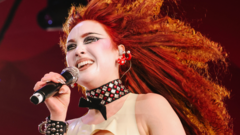
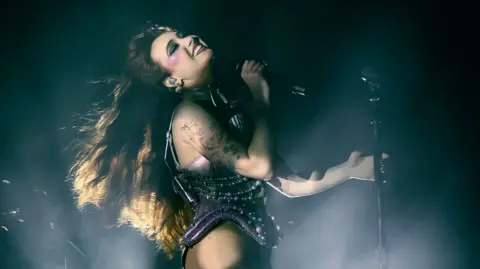 Getty Images
Getty ImagesWhat is it called when an artist's first album is already a greatest hits collection?
That's the question I kept asking during Chappell Roan's first UK show of 2024 on Friday.
Normally, concerts ebb and flow, but the audience at the Manchester Academy knew more than just the singles. They sang every word, every ad lib, of every song - some with mascara running, others with hands clasped to their chests.
At times, Chappell herself was drowned out. At others, she simply stopped and listened, as the fans chanted her lyrics back at her.
It's a phenomenon - or, to use Chappell's terminology, a Femininomenon - that only occurs once in a blue moon.
I saw it when Olivia Rodrigo played her first UK dates in 2022. I saw it when One Direction hit Wembley Stadium. And I saw it on the first leg of Amy Winehouse's Back To Black tour, before excitement turned to concern.
It happens when an artist speaks directly to their fans. More accurately, it happens when fans feel like an artist is speaking on their behalf.
For Chappell's audience, the devotion is particularly potent because of what she represents.
The 26-year-old is the first pop star to achieve mainstream success as an openly queer person, rather than coming out as part of their post-fame narrative.
Her debut album, The Rise And Fall Of A Midwest Princess, is a real-life coming of age story, full of messy, complex relationships and tentative sexual experimentation.
She made the first half of it while dating a man, but the lyrics betrayed her true feelings.
“I wrote a lot of queer songs while I was dating him, even though I had never even kissed a girl,” she told the Q with Tom Power podcast last year..
“It was something I wanted so bad, but I didn’t know how to make it real,” she added, in a BBC interview this April.
In those songs, Roan draws on the power-pop sounds of Lady Gaga and Britney Spears, skewing them with campy cheerleader chants and bawdy sexual asides.
Her calling card is Pink Pony Club, the semi-autobiographical story of a small-town girl’s transformation into a go-go dancer, written after her first visit to a Los Angeles gay club in her early 20s.
But her break-out hit was this year's Good Luck Babe, about a fling with a girl who insists she's not gay.
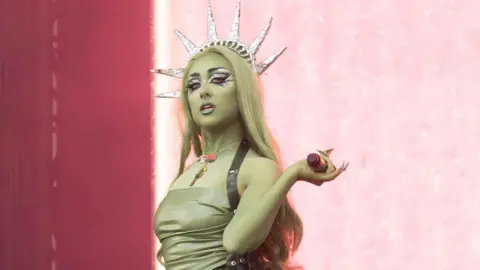 Getty Images
Getty Images'She's killing it'
At first, the song is one big eye-roll: Just shut up and admit the truth, Chappell insists, before you get trapped in a loveless, heterosexual marriage of convenience.
Then, in the closing bars, the song slows down like a toy whose batteries have run out. It’s the end of the argument. Chappell has screamed her case to the point of exhaustion. She drops an octave and sings, “you’d have to stop the world just to stop this feeling", and her voice is quietly resigned. This is one last plea, and she knows it will fall on deaf ears.
It's superb songwriting - pointed and specific, full of meaning.
Fans in Manchester said lyrics like those make her more important than other pop stars.
"Being a big, mainstream queer artist is really important," said Manchester fan Sarah. "She’s what we’ve been waiting for in pop music for a long time."
"When I first heard her, I looked her up and I was like, 'She looks like me, she’s queer like me and she’s killing it'," agreed Bethan, who had travelled to the show from Bristol.
"I was like, that’s my girl."
"If I was a younger, like a teenager, looking up to Chappell Roan, that would have been really inspiring," added Kim, a Newcastle fan who was at the gig to celebrate her third wedding anniversary with her wife, Jules.
"It’s something I would have really gripped onto. It would have helped us through the coming out phase."
A 10-year overnight success
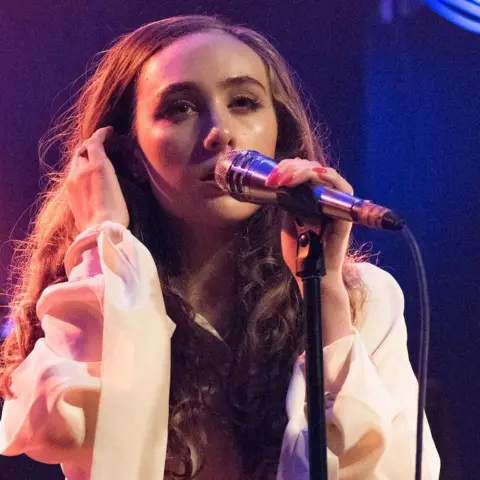 Getty Images
Getty ImagesFor the uninitiated, Chappell Roan was born Kayleigh Rose Amstutz in the conservative city of Willard, Missouri, in 1998.
The eldest of four children, she grew up in a trailer park and attended church three times a week, where she was taught that being gay was a sin.
Shy and awkward, her life changed in 2014 when a song she’d written at summer camp and uploaded to YouTube caught the attention of several record labels.
Whisked out to Los Angeles and signed to Atlantic Records, she released her first EP, a downbeat, singer-songwriter affair, in 2017.
It sold poorly and when the pandemic hit, she was dropped amid a round of money-saving lay-offs. Despondent, she went back to Missouri and took a job serving coffee at a drive-through donut shop.
But she stayed in touch with one of her collaborators, Daniel Nigro, who was simultaneously working with another up-and-coming pop star called Olivia Rodrigo.
When Rodrigo's career took off, Nigro used the cachet to sign Chappell to his own label and they wrote her album together, discarding the self-seriousness of her teenage material and diving headfirst into hedonism.
“A lot of it is audience participation based,” she told me earlier this year. “I just tried to think, what's really hooky and what would be fun to sing with a crowd. Those were my parameters.”
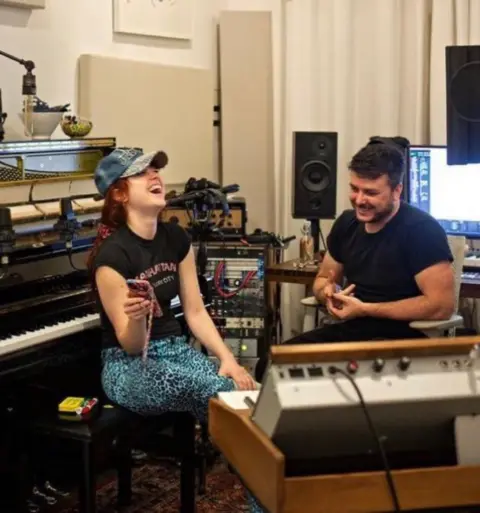 Chappell Roan
Chappell RoanThe album came out to almost universal disinterest last September, selling just 3,000 copies in its first week. But it ended up on a few critics' end-of-year lists and, as word began to spread, Roan went out as a support act on Rodrigo's Guts tour.
After the first few dates, fans started coming to the shows early just to see her performance.
But the hot streak really kicked off with her televised set at the Coachella Festival in California this April. When Chappell leaned into the TV cameras and declared: “I’m your favourite artist’s favourite artist," the show went viral. It's subsequently been watched more than a million times.
She went on to dominate New York’s Governors Ball, where she memorably coated herself in green body paint and dressed as the Statue of Liberty; and Chicago’s Lollapalooza, where she drew the festival’s biggest-ever crowd - some 80,000 people - even though she wasn’t a headliner.
By the summer, The Rise And Fall Of A Midwest Princess had ascended to the top of the UK album charts. Earlier this week, she won best new artist at the MTV Awards.
As is so often the way, however, success has come at a price.
Chappell took to social media last month, asking some fans to stop being obsessive and "creepy", after one grabbed her and kissed her in a bar. In another incident, police at LAX Airport had to intervene when a fan who wanted an autograph wouldn’t take “no” for an answer.
“I’ve been in too many nonconsensual physical and social interactions and I just need to lay it out and remind you, women don't owe you [anything]," wrote the singer on Instagram.
The audience in Manchester took no such liberties. They were "day one" fans - people who'd bought their tickets in January, before the singer's meteoric rise to fame - and they wanted to celebrate with her.
Scalpers were offering over £1,000 for tickets that had a face value of £19.50 - but no-one was selling.
Instead, they came dressed in the mermaid outfits Chappell had requested. There were fishtails, bikinis, and crowns befitting of Princess Ariel. One brave fan came dressed as a jellyfish. A couple who described themselves as "masculine-presenting" lesbians wore sailors outfits.
Chappell also joined the fun, wearing a one-piece bodysuit encrusted with pearls and seashells.
And she dedicated the show to the fans, saying their acceptance mattered as much to her, as her music did to them.
"Thank you for dressing up," she said. "Thank you for being here and showing up for the [LGBTQ+] community.
"I really needed this when I was 15. I needed it so bad to be in a room full of people that looked like me.
"The people in my hometown would call gay people clowns. That’s why I actually wear white face [drag make-up], because of how those people called us clowns.
"I was like, 'Bitch I’ll show you a clown'."
Cue a deafening round of applause.
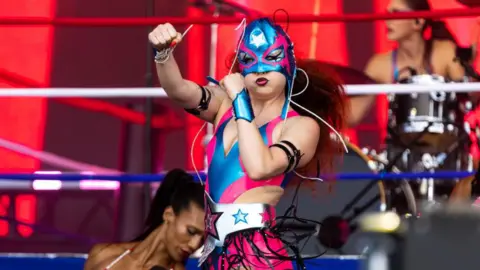 Getty Images
Getty ImagesAnd that's before we even discuss the show itself.
As a performer, Chappell is the full package. She doesn't have the budget (yet) for a spectacular stage set, but she's a pyrotechnic all of her own - a finger-snapping, hair-tossing, force of nature.
Backed by a full live band, her vocals are flawless. She moves seamlessly between her lower and upper registers, belting the high notes with a slight country twang, but equally capable of dropping to a hushed, heartbroken whisper.
Highlights included Coffee - a tentative ballad about meeting up with an ex - and the lemon-bitter My Kink Is Karma, which got an invigoratingly grungy rock makeover.
The crowd participation moments that the star envisaged in the recording studio also came to bounteous fruition.
Hot To Go, which she's described as "YMCA, but gayer", came with big goofy dance moves; and Red Wine Supernovas's singalong chorus gave me actual goosebumps.
Amusingly, the singer says her teenage self would have been horrified by this spectacle.
“I think she would be like, ‘Oh my God, you're so corny’," she told me in April.
“I don't think I'd have allowed myself to be silly back then. She’d think I’d sold out. But I'm not a sellout. I'm actually just having a good time.
“I love pop music and I make silly pop music because people want to have fun.”
Mission accomplished.
Chappell Roan's Manchester setlist
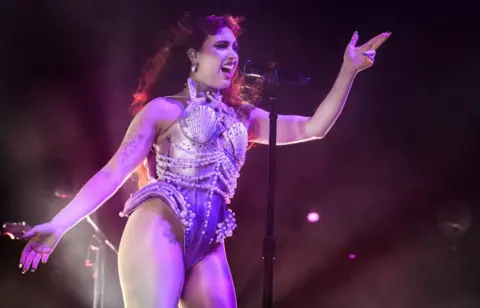 Getty Images
Getty Images- Femininomenon
- Naked In Mahattan
- Super Graphic Ultra Modern Girl
- Love Me Anyway
- Picture You
- Hot To Go
- After Midnight
- Coffee
- Casual
- Subway
- Red Wine Supernova
- Good Luck, Babe
- My Kink Is Karma
- California
- Pink Pony Club
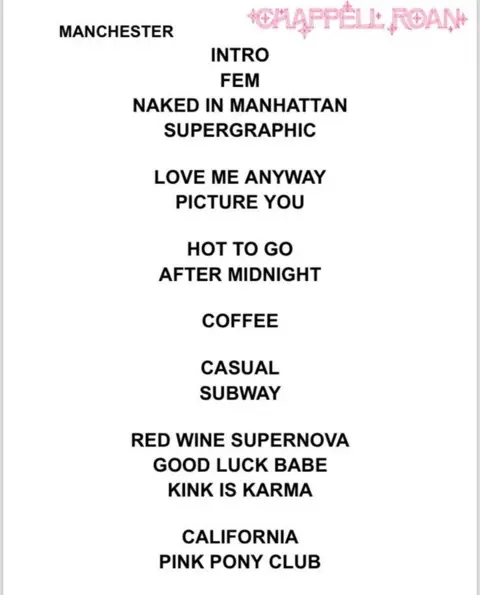 Chappell Roan
Chappell Roan


 Africana55 Radio
Africana55 Radio 

